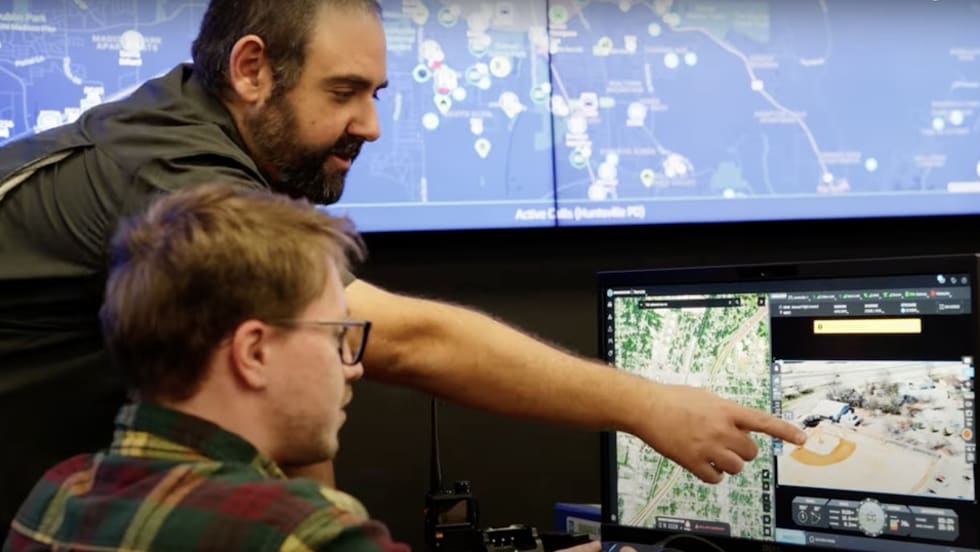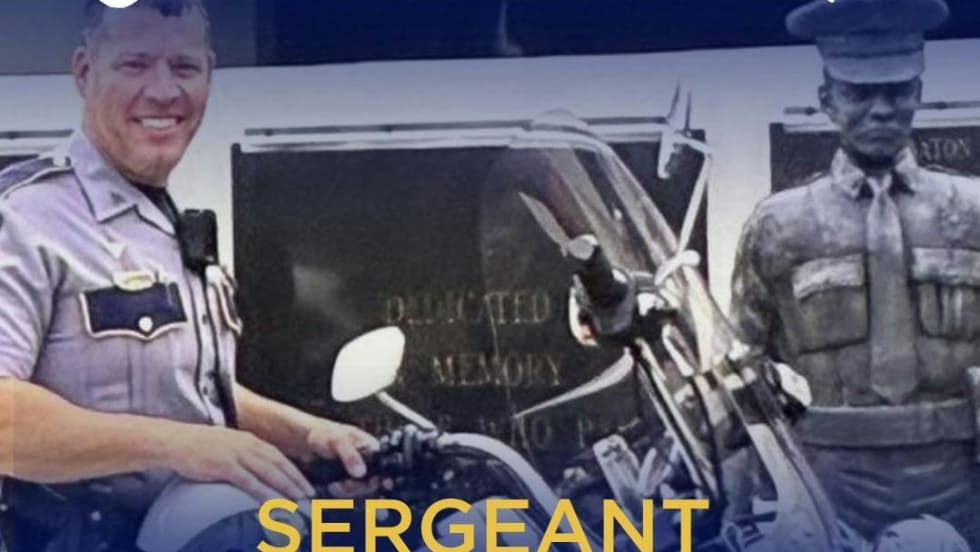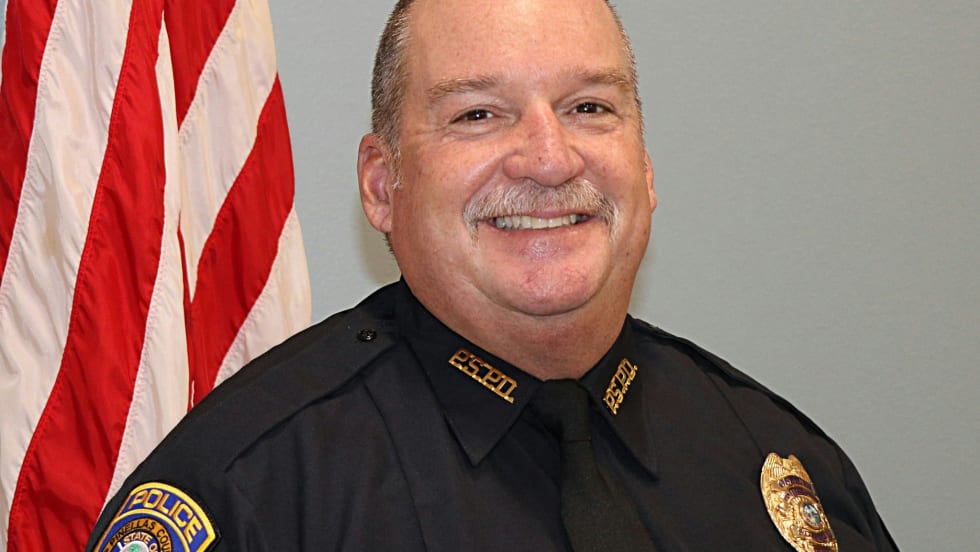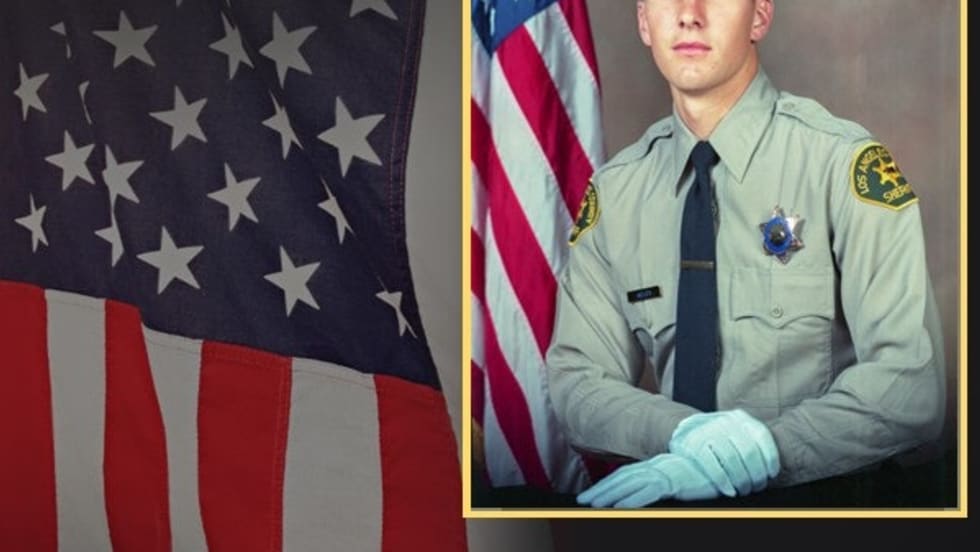This month, you're receiving an enhanced "Shots Fired" from POLICE Magazine. In addition to the usual gripping storytelling, we've also embedded links to the radio dispatch traffic, overhead thermal-image view from the helicopter and photos from the crime scene. Enjoy.
The events that culminated with Det. James Peters saving one man's life while taking another's began to unfold after midnight on April 23, 2006, well before Peters became involved.
It started quietly enough. A Peoria, Ariz., police officer came across a disabled BMW being pushed by Daniel Brown near the 101 Loop. Turning on his rotators, the officer cruised slowly behind Brown in his patrol car so as to block traffic and give the man a safe corridor in which to move the stalled car.
Most stranded motorists would have been satisfied with that, but the 38-year-old Brown wanted the officer to use the push bumper of his patrol car to move the disabled vehicle off the roadway.
The Peoria officer told Brown that he couldn't do that as he'd be putting himself in the position of many similarly well-intentioned officers who'd gone on to pay the price for alleged damages thereafter, and so Brown put his broad shoulder back to the BMW.
Finally getting the car off the roadway, Brown waved at the officer who turned off his rotators and started to drive away, but not before running the license plate of the BMW. Seconds later, Peoria Dispatch informed the officer that the license plate returned stolen.
AUDIO: Listen to dispatch traffic between officers and airborne units who were pursuing Brown.
Guns Drawn
The officer made a U-turn and re-contacted Brown, this time with the intent of arresting him. A scuffle ensued with the officer taking Brown's legs out from under him. Upended like a turtle and finding the officer standing over him, Brown suddenly produced a handgun from his waistband. However, the Peoria officer was no less quick on the draw and a short standoff ensued.
"You don't want to do this," Brown pleaded as he started backpedaling up the street. "I have a kid."
But it wasn't parental empathy that kept the Peoria police officer's trigger finger in check. It was a crowded gas station behind Brown.
Brown turned and ran toward the gas station, attempting to take car keys from patrons as they fled the mart area of the station.
By now, other officers descended on the scene and two of Peoria's finest approached the front of the store in plainclothes in a bid to locate Brown.
In the meantime, Brown escaped through the back door of the store and doubled back around to the front. Hearing commotion in front of the gas station, the two officers turned to investigate.
As they did, Brown raised his gun at them and pulled the trigger.
Click.
Brown hadn't realized that as he ran out the back door, he hit the magazine release on his gun and dropped his magazine. The magazine disconnect on his semi-automatic prevented him from firing any rounds-despite there being a round in the chamber.
Eastbound
Brown ran to the opposite side of the gas station where he found a Krispy Kreme truck with its doors open and tailgate fully lowered. He jumped into the passenger side of the truck and jabbed his gun at its driver.
"Drive!"
Brown's hostage punched the gas pedal and the truck exited the parking lot just as the Peoria police units pulled in.
As the Krispy Kreme van drove along Thunderbird Road, Brown prodded the driver at gunpoint and told him to jump out of the moving vehicle.
The man didn't hesitate.
With the delivery driver out of the truck and out of the way, Brown assumed control of the vehicle, leading Peoria PD, Arizona Highway Patrol, Phoenix PD, and Maricopa County Sheriff's officers on a 40-mile pursuit that was monitored by a Phoenix PD helicopter and videotaped by a Department of Public Safety helicopter.
Throughout the pursuit, there were multiple attempts to deploy spike strips, without success, and Brown continued eastbound on Highway 101 toward Scottsdale at high speeds.
PHOTOS: See images from the crime scene.
[PAGEBREAK]
Spike Strips
Det. James Peters had been out and about on the prowl for a home invasion suspect when he copied radio traffic of the approaching pursuit. As Brown exited the 101 Freeway at Chaparral, the Scottsdale SWAT officer put himself on an intersecting path with the suspect's anticipated direction of travel. Scottsdale officers were instructed to confine their involvement to providing support by shutting down intersections and deploying spike strips.
And to that end, they'd been successful: The van's tires were beginning to come apart, large flaps of threads pinwheeled out from the chassis, and a big rooster tail of sparks shot out from beneath the lift gate as it scraped along the asphalt.
A Scottsdale sergeant followed the pursuit to give updates to fellow officers and let them know which intersections to cut off. The suspect drove all the way down Chaparral and turned northbound on Scottsdale Road.
Peters paralleled the pursuit on a side street, figuring that if it turned into a barricade situation or if Brown got out of the car and ran, he would be able to help set up a perimeter.
As the suspect drove through the intersection of Shea Boulevard and North Scottsdale Road, he turned into a shopping center. Despite the late hour, the parking lot was packed with pedestrians and vehicles due to the presence of a very large bar/dance club at its center. Brown ran the vehicle onto a curb in front of an adjacent Safeway store.
Peters assumed a perimeter position as a canine officer put himself in foot pursuit of the suspect who ran in a northwest direction through the lot. In a matter of seconds, Brown put enough distance between himself and the canine cop as so to leave some ambiguity about his exact location (later, FLIR video footage from the aero unit would show the desperate Brown checking the doors of various businesses on the property).
Barricade Brewing
Noticing the ruckus outside of the store, the Safeway night shift manager locked the doors of the southernmost entrance to the store. But the north doors had no locking mechanism on them, obligating the manager to stand there and physically hold the doors together.
Brown emerged from the alley behind the store. Expecting the north doors to open automatically, he ran headlong into them, knocking the doors off their hinges, and sending the brave manager flying.
Just inside the door, a female employee had been stocking merchandise in a cooler when Brown burst in. Brown lunged for the woman, who screamed and ran away. However, an elderly male employee wasn't so lucky. Having his back to the door while filling soup containers, he was unaware of Brown's approach. Brown grabbed the man and forced him at gunpoint to the back stocking area.
Several Peoria PD officers had followed Brown into the store, stopping near the cash registers where they lost sight of him. Seeing that the situation was spiraling into a barricade, the Scottsdale PD watch commander told his officers to secure a tight perimeter and requested SWAT units to respond to the location.
Peters pulled away from his perimeter position and parked his car at the command post. Then grabbing his rifle and gear, he reported to the incident commander who directed him to enter the store to deal with the hostage situation. With his SWAT training and background in negotiations, Peters was the ideal candidate for the job.
Going Inside
Save for some incongruously upbeat music being piped in over its speakers, a stillness had descended over the store. Near the cash registers, several Peoria PD officers-still pumped with post-pursuit adrenaline-excitedly advised Peters that the suspect had moved to the back of the store, but that his exact whereabouts were unknown.
Having worked patrol in the area, Peters knew of a catwalk above the cash registers where one-way glass allowed loss prevention officers to look down the aisles. Peters advised his sergeant that he was going to access the catwalk and scan the aisles for Brown.[PAGEBREAK]
Entering a door he thought led to the catwalk, Peters instead found himself behind the meat counter. Blessedly, it afforded an angle from which Peters could see Brown and his hostage just beyond a set of double doors that led to the back of the store.
Peters ordered Brown to release the hostage.
Brown's response was obscene and emphatic, ending with the word "you."
Keeping his back toward an alcove wall, Brown made his way to a doorway using the hostage as a shield between himself and Peters. As he drew near the doors, Brown suddenly spun himself and the hostage around and ran out the door.
But the advanced years of his hostage compromised Brown's gait and he fell. Beyond the threshold, Brown stood over the kneeling hostage and put the gun to the old man's head.
Det. Peters took one step out the door, his Colt Commando in tow.
There was no time to get into a better position, no chance as Peters saw it to put his negotiation skills to work. Dropping down to afford himself an upward shot in deference to the possibility of any friendlies in the darkness beyond, Peters took aim and squeezed the Colt's trigger.
A 75-grain .223 round exploded from the Colt's 11-inch barrel and tore into Brown's back. As Brown's body recoiled upward from the blow, Peters took aim at the man's head and squeezed the trigger a second time.
Brown was dead before he hit the ground.
Keeping the Faith
Brown was hardly unknown to Arizona authorities, and in the aftermath of the shooting it was determined that he'd shot and killed a man two months earlier over a drug deal. And the fact that Brown had effectively disarmed himself by accidentally dropping his magazine doesn't mitigate Peters' heroism. Such facts were not known until well after the incident.
"The plainclothes officer that came to the situation after the initial standoff said that he saw Brown pull the trigger to shoot at him," Peters notes. "We're guessing that's when it happened, but we don't truly know. There was a primer strike on it, but we don't know when that happened. It didn't happen with the initial officer at the traffic stop because the gun had a magazine drop safety. If he had fired with the magazine in it prior to hitting the door in the QT gas station the gun would have gone off."
The hostage victim has been interviewed several times since the incident. A special meeting was held between Det. Peters and the victim, as well as the victim's appreciative family.
This was the fourth of six shootings that Det. Peters has been involved in so far in his career. After his first shooting, he couldn't sleep, he had nightmares in which he would relive the incident, and communication problems developed in his marriage. Six months later, he was involved in another shooting.
It was after his second shooting that Peters met with a non-departmental psychologist who insisted on meeting individually with him, as well as jointly with he and his wife. Peters credits this psychologist with teaching him how to communicate with others.
In marked contrast from his personality prior to his counseling, he is now very candid about his experiences. He began to teach classes about officer-involved shootings. He is able to recall a great deal of detail about his shootings, having experienced some auditory exclusion, but never having tunnel vision.
Peters notes that the coping mechanisms in dealing with shootings can be very different from person to person. While psychological counseling has certainly helped, Peters cites his faith as having sustained him, as well. Early in his career, that faith was on shakier ground.
Raised a devout Christian, Peters had found himself straying from that path. He felt that people who disagreed with him were against him and took it as a personal attack instead of trying to learn from it. This made him reticent to talk with people, something which cost him in the short run.
But after his first shooting, his mother-in-law gave him a small inspirational book for police officers that he still carries with him today. It relates scriptures from the Bible to different situations that police officers may face on the job.
"It talks about why taking a life doesn't necessarily make you a bad person," Peters says. "You have to examine why you took the life. Having a belief system that helps you answer those unknown questions, whether you believe in God or not, helps lift the weight off my mind."
For his heroic actions that night, Peters received the Scottsdale Police Department Medal of Valor and was a top three finalist for the American Society for Industrial Security International award.
But not everyone was so enamored of Peters' actions. One local newspaper in particular seemed to go out of its way to put Peters in a bad light following his shootings.
"Fortunately, the people of Arizona stood up and let the news know that what they were doing was wrong," recalls an appreciative Peters. "They called the mayor and the chief and wanted to make sure that I was being taken care of."
Peters continues to serve the people of Scottsdale. And he does so with the peace of mind that comes with knowing that he has their back. And they have his.













